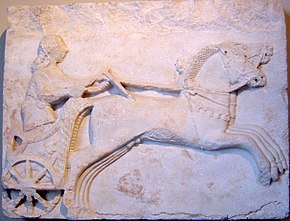Cyzicus
| Κύζικος (Greek) آیدینجق (Ottoman Turkish) |
|

Bas relief of a charioteer, late 6th century BC
|
|
| Location | Erdek, Balıkesir Province, Turkey |
|---|---|
| Region | Mysia |
| Coordinates | 40°23′N 27°53′E / 40.38°N 27.89°ECoordinates: 40°23′N 27°53′E / 40.38°N 27.89°E |
| Type | Settlement |
| History | |
| Builder | Pelasgian settlers |
| Abandoned | 11th century AD |
| Periods | Archaic Greek to High Medieval |
| Cultures | Greek, Ancient Roman, Byzantine |
| Events | Siege of Cyzicus |
Cyzicus (/ˈsɪzᵻkəs/; Ancient Greek: Κύζικος Kyzikos; Ottoman Turkish: آیدینجق, Aydıncıḳ) was an ancient town of Mysia in Anatolia in the current Balıkesir Province of Turkey. It was located on the shoreward side of the present Kapıdağ Peninsula (the classical Arctonnesus), a tombolo which is said to have originally been an island in the Sea of Marmara only to be connected to the mainland in historic times either by artificial means or an earthquake.
The site of Cyzicus, located on the Erdek and Bandırma roads, is protected by Turkey's Ministry of Culture.
The city was said to have been founded by Pelasgians from Thessaly, according to tradition at the coming of the Argonauts; later it received many colonies from Miletus, allegedly in 756 BC, but its importance began only after the Peloponnesian War, when the decay of Athens and Miletus set in. Alcibiades defeated the Lacedaemonians there (410 BC). Eudoxus of Cnidus had a school at Cyzicus and went with his pupils to Athens, visiting Plato, and then returned to Cyzicus, where he died 355 B.C. The era of Olympiads in Cyzicus was reckoned from 135 or 139.
...
Wikipedia

